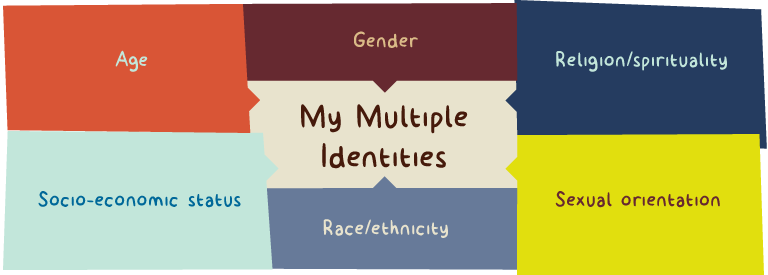These big ideas are mentioned frequently, so let's take a second to define them!
First, let's tackle identity. We can discuss identity in the singular form, identity, or in the plural form, identities. In both of these cases, we are referring to all of the learned and inherited factors that make you, you! This can include factors like:
- Race
- Ethnicity
- Culture
- Citizenship
- Primary Language
- Religion
- Ability
- Gender
- Sex
- Sexuality
- Socioeconomic Class
- Education
- Inherited Wealth
- Age

In the plural form, the word "identities" can refer to all the different factors that make up an individual. It can also sometimes be used to refer to a group of people who share a common factor, such as using the term"racialized identities" in reference to the experiences of people of colour or "LGBTQ+ identities" when talking about the collective experiences of lesbian, gay, bisexual, trans, or queer individuals.
All of our personal identities combine in what is known as intersectionality. When we refer to intersectionality, we are discussing how all the various identities we hold combine to create a unique lived experience. We can picture this as many roads meeting at a central point, with our whole unique person at the centre.

Intersectionality helps us understand that not all people who share an identity have the same experiences or needs. For example, we can look at this in terms of women's suffrage movements. These movements often claimed to work for the good of all women, but they only addressed the experiences of cis-gendered, able-bodied, straight, white women, leaving many women with different intersectional identities behind.
Intersectionality gives us a term to talk about why my needs, rights, experiences, and advocacy as a white disabled lesbian might be different from the needs of a lesbian woman of colour or a disabled man. It is also useful when discussing factors in issues like job security (where employer biases function differently regarding combined factors like race and religion) or domestic abuse (where combined factors of class, sexuality, and gender have proven to impact one's ability to leave a relationship safely) where combined biases alter one's lived experiences.
For a great visual metaphor of intersectionality using Pizza, check out this video by Akilah Hughes!
In the context of a society, our identities can act as an advantage or disadvantage in the opportunities available to us. This is because our society's very laws and structure conspire to actively benefit certain groups of people over others. This is known as privilege.
As a straightforward example, consider a 3 story building with no elevator. For people who can easily walk from one place to another, the stairs are not an obstacle to them getting something they need from the third floor. However, for someone with crutches, getting to the top floor becomes a greater challenge, and for someone in a wheelchair, it could be impossible for them to get to the third floor without help. This would be an example of able-bodied privilege. Some types of privilege can be physical, like being able to walk upstairs. Some can't be seen as easily, like those relating to racism, sexism, homophobia, or other types of discrimination.

Everybody benefits from some form of privilege, and it isn't a dirty word. Being privileged does not mean that you don't work hard or that all of your life has been easy. It just means that, for everything you have had to struggle with, a given facet of your identity wasn't one of them. If you ever see the comment to "check" or "consider" your privilege, they are (usually) not trying to insult you or suggest that you don't work hard. They are asking you to reflect on the ways society may have made your achievement just a little easier to get than it may have been for someone else and to think about how you can be more considerate to others or work to make the task easier for the next person.

Comments